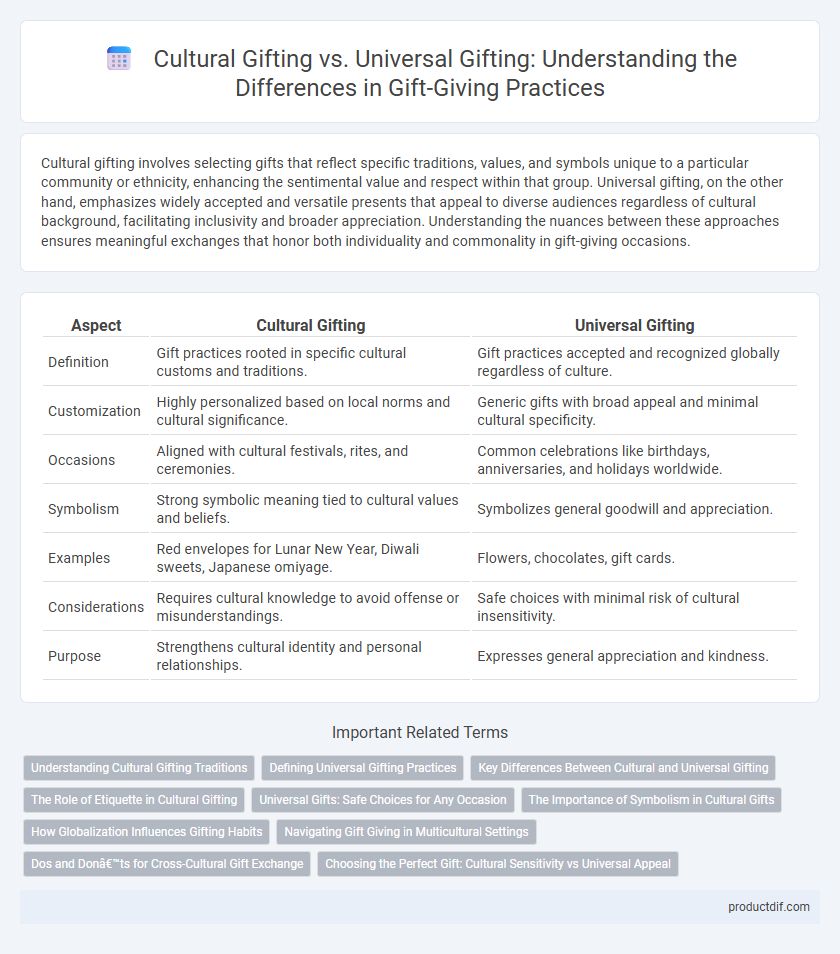Cultural gifting involves selecting gifts that reflect specific traditions, values, and symbols unique to a particular community or ethnicity, enhancing the sentimental value and respect within that group. Universal gifting, on the other hand, emphasizes widely accepted and versatile presents that appeal to diverse audiences regardless of cultural background, facilitating inclusivity and broader appreciation. Understanding the nuances between these approaches ensures meaningful exchanges that honor both individuality and commonality in gift-giving occasions.
Table of Comparison
| Aspect | Cultural Gifting | Universal Gifting |
|---|---|---|
| Definition | Gift practices rooted in specific cultural customs and traditions. | Gift practices accepted and recognized globally regardless of culture. |
| Customization | Highly personalized based on local norms and cultural significance. | Generic gifts with broad appeal and minimal cultural specificity. |
| Occasions | Aligned with cultural festivals, rites, and ceremonies. | Common celebrations like birthdays, anniversaries, and holidays worldwide. |
| Symbolism | Strong symbolic meaning tied to cultural values and beliefs. | Symbolizes general goodwill and appreciation. |
| Examples | Red envelopes for Lunar New Year, Diwali sweets, Japanese omiyage. | Flowers, chocolates, gift cards. |
| Considerations | Requires cultural knowledge to avoid offense or misunderstandings. | Safe choices with minimal risk of cultural insensitivity. |
| Purpose | Strengthens cultural identity and personal relationships. | Expresses general appreciation and kindness. |
Understanding Cultural Gifting Traditions
Understanding cultural gifting traditions is essential for meaningful exchanges, as gift-giving practices vary significantly across different societies, reflecting unique values and social norms. For instance, in Japan, gifts are often meticulously wrapped and presented with both hands to show respect, while in many Western cultures, personalized or experiential gifts emphasize individual relationships. Appreciating these cultural nuances prevents misunderstandings and enhances the impact of the gift within diverse global contexts.
Defining Universal Gifting Practices
Universal gifting practices encompass gestures and items recognized across diverse cultures, emphasizing symbols of goodwill, such as flowers, chocolates, or gift cards, which transcend cultural nuances. These practices prioritize inclusivity and simplicity, making the act of gifting accessible and meaningful worldwide. Understanding universal gifting can enhance global relationships by fostering shared values of generosity and appreciation.
Key Differences Between Cultural and Universal Gifting
Cultural gifting often involves specific traditions, symbols, and meanings unique to a particular group, reflecting historical values and social norms, while universal gifting emphasizes broadly accepted items like flowers or chocolates that transcend cultural boundaries. Cultural gifts may require deep cultural understanding to avoid misinterpretation, whereas universal gifts prioritize general appreciation and inclusivity. Key differences include the cultural significance, the appropriateness based on local customs, and the emotional impact tailored to specific cultural contexts versus global appeal.
The Role of Etiquette in Cultural Gifting
Etiquette plays a crucial role in cultural gifting as it reflects respect and understanding of traditions unique to each culture, such as the specific types of gifts deemed appropriate or the timing of gift exchanges. Unlike universal gifting, which emphasizes general goodwill and appreciation, cultural gifting requires awareness of customs like gift wrapping, presentation, and recipient hierarchy to avoid misunderstandings or offense. Mastery of these etiquette nuances enhances the significance and acceptance of gifts across diverse cultural contexts.
Universal Gifts: Safe Choices for Any Occasion
Universal gifts such as gift cards, gourmet chocolates, and elegant candles serve as safe choices for any occasion, ensuring broad appeal across diverse cultures and personal tastes. These gifts minimize the risk of cultural misunderstandings and are appreciated for their practicality and versatility. Opting for universally accepted presents simplifies the gifting process while maintaining thoughtfulness and respect.
The Importance of Symbolism in Cultural Gifts
Symbolism in cultural gifts reflects deep-rooted traditions and conveys meaningful messages unique to each society, enhancing the emotional value of the exchange. Universal gifting often prioritizes practicality and broad appeal but may lack the rich context and significance embedded in cultural symbols. Understanding the cultural symbolism behind gifts fosters respect, strengthens relationships, and preserves heritage across diverse communities.
How Globalization Influences Gifting Habits
Globalization reshapes gifting habits by blending cultural traditions with universal preferences, creating a hybrid exchange environment where diverse customs coexist. Cross-cultural interactions foster the adoption of universally appreciated gifts like technology or experiences, while maintaining the unique symbolic meanings of traditional presents in various societies. This convergence drives businesses to tailor gift products and services that cater to a global audience, reflecting evolving consumer behaviors influenced by interconnected markets.
Navigating Gift Giving in Multicultural Settings
Navigating gift giving in multicultural settings requires understanding both cultural gifting customs and universal gifting principles to ensure respect and appropriateness. Cultural gifting often involves specific rituals, symbolism, and timing unique to each culture, while universal gifting emphasizes thoughtfulness, generosity, and the recipient's preferences. Awareness of these differences helps avoid misunderstandings and fosters meaningful connections across diverse cultural backgrounds.
Dos and Don’ts for Cross-Cultural Gift Exchange
Respect cultural norms by researching the recipient's traditions, avoiding taboo items, and considering appropriate gift presentation to ensure positive reception. Choose universally appreciated gifts such as flowers, chocolates, or quality stationery when uncertain, while steering clear of overly personal or expensive items that may cause discomfort. Be mindful of timing and gestures, including gift wrapping colors and the use of both hands when presenting, to demonstrate genuine respect and foster cross-cultural understanding.
Choosing the Perfect Gift: Cultural Sensitivity vs Universal Appeal
Choosing the perfect gift requires balancing cultural sensitivity with universal appeal to ensure meaningful recognition across diverse recipients. Understanding cultural norms, such as color symbolism or gift-giving rituals, prevents misunderstandings and shows respect for traditions. Selecting gifts with broad resonance, like quality craftsmanship or personalized touches, enhances appreciation regardless of cultural background.
Cultural Gifting vs Universal Gifting Infographic

 productdif.com
productdif.com